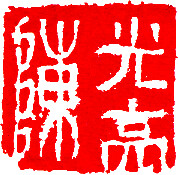|
Tuesday, March 16, 2004
the gaijin among us
Today I had a special 2-hour lesson that I planned with fellow (Jahz Law) teacher Selman about two topics near and dear to me: -Japanese stereotypes about foreigners -Foreigner stereotypes about Japanese people. The class was quite small, but we had a good discussion. Oddly enough, all the students that attended were women - usually it's the Japanese men who get all riled about the topic. One of my favorite students, who I've nicknamed "my homie the pig doctor", once said the most hilarious quote ever about the topic: "I WISH JAPANESE PEOPLE WERE MORE LIKE KOREANS" (more on that ironic statement in a later blog entry) Most Japanese people, especially young people, are surprised to learn that the majority of the people that they consider foreigners in their country are not the visible types, such as your run of the mill average, Joe Schmoe Whiteguy, but others - two of the largest groups of "foreigners" here in Japan: Chinese and Korean people, of course. (where do Japanese people think makes all the kimchi and yumcha they eat, anyways?) The English understanding of the word "foreigner" is just anybody who's a non-citizen and from a different country. But the understanding of the Japanese word "foreigner" often applies to anybody who is not ethnically "Japanese", regardless of citizenship. Many permanent residents here in Japan, such as 2nd, 3rd, and 4th generation Chinese and Korean children born here in Japan, are for all sakes and purposes, culturally and even linguistically Japanese. Most Chinese and Korean families who become citizens here in Japan are by law forced to adopt the Japanese pronounciation of their names - for example, the Chinese name 'Lin' (forest) is changed to 'Hayashi' (Japanese pronounciation of the identical character). However, because of the household registration system here in Japan, it's easy to trace back any family's roots and discover their, *gasp* Chinese-ness or Korean-ness. The system dates back to the Tokugawa era, where all Japanese families were by law ordered to register their families with local Buddhist temples - the original intent being to stomp out Christianity. Anyways, it was fun to see how perceptive the students were about stereotypes of Japanese people. One of my favorite students, a university English teacher who used to live in Ohio, had a lot of stories to share. Of course, the discussion also turned to me and my experiences being an Asian-American teaching English here in Japan. I guess I take for granted how often my meeting both foreign English teachers and Japanese students of English breaks their stereotype of who speaks and teaches English. At the end of the lesson, another student made an even more funny comment about the stereotype that all English teachers in Japan are highly qualified (they're not): "I think you guys (Selman and I) are the only qualified English teachers in all Japan!" Hahaha. Did I also mention we taught them the term cultural imperialism? A Chinese American Christian and Indian Canadian Muslim teaching the modern Babylonian language (AKA English) to Japan. It's a wacky world. .:. Closing time at the internet cafe. One last thing: comment system update. The old place I got my comment system from went all stupid and is saying I can only have 5 comments per entry now. BOO. |
Comments:
Post a Comment
|
in?scrip?tion (n-skrip-shun)n.
the facts.
|










